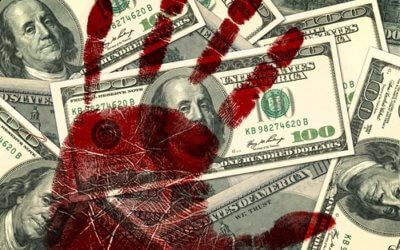Discover the importance of organizational alignment and agility in this blog post. Learn how establishing a strong CORE and building a strategy around it can lead to sustainable growth and success. Find out how alignment and agility empower your organization to thrive in an ever-changing business landscape.

What if the Coronavirus Comes to the US?
My last blog post talked about the effects of the coronavirus that appeared on Sunday, before Monday’s fall in the market. Now, I want to look at the impact if the coronavirus comes to the U.S., as the CDC expects.
Slowing the Spread
Listening to a virologist today, he said that if the virus comes, the way to slow the spread is:
-
Stay home if you are sick;
-
Keep kids at home if they are sick;
-
Avoid unnecessary travel; and
-
If it gets worse, stop large gatherings of people, i.e., sporting events, conferences, and church congregations.
-
Also, firms should look at ways to allow workers to telecommute.
All of these suggestions are fine in principle but unlikely to be effective immediately due to the nature of the U.S., namely:
-
No social net, so people are unlikely to stay home if sick. Under many changes to SNAP and other programs, people who don’t work are ineligible for benefits, so they will keep working as long as they can.
-
Inadequate health insurance for many due to the current administration’s rollback of the Affordable Care Act regulations and allowance of so-called “junk plans” in the market, with the result that many poor people will not get tested due to the costs;
-
No security net for parents whose kids are sick and cannot afford to stay home and look after them. They will send their kids to school because their children need food and they need to work.
-
No security net for many gig workers, i.e., Uber drivers, who are will see a fall in income as travel decreases. If the virus transferable through surfaces, this will be even worse.
-
No social net for many workers in the travel industry, i.e., hotel employees, wait staff at restaurants, and those at conference venues as travel expenditure falls.
Therefore, sick people will stop working only when companies shut their doors. Many firms are unlikely to institute testing due to cost concerns; thus, I expect many firms to operate until the number of sick people is so high that the firm has to close.
Thus, I see the spread being higher and faster than in China and Italy, which have instituted significant measures to stop human contact. If the government does implement the type of action that China and Italy have, we can expect a fall in incomes, an increase in bankruptcies, and more social unrest.
Supply Chain Disruption
A virus in the U.S., for the reasons above, would further disrupt the supply chain as iI discussed in my previous post and by others. Companies would get into issues, due to:
-
No Products due to a lack of raw materials, a lack of workers to build products, or in the travel industry, no customers.
-
No Sales. The end customer may no be purchasing as they cannot use the products as they have too much inventory or just a reduction in demand as workers stay home.
The effect of this would be to slow sales, but more importantly, slow down cash flow and thus cause far more significant damage. Companies don’t go out of business because they lose money; they go out of business because they run out of cash. Several articles have mentioned the precarious financial position of low credit corporate borrowers. If cash flow dries up, we can expect many of these companies to fail, leading to a domino effect on healthier ones, as we saw in 2008. Also, many over-leveraged companies would have to implement drastic measures to survive; thus, we can expect more layoffs and fewer purchases. None of this bodes well for the economy. Given that Goldman has dropped its GDP forecast to 1.2% for the quarter, we could be negative territory as global demand slows, and more disruption of global supply chains continues.
The Effect on the Medical Establishment
Overall, from what I have read, I don’t see many people dying given the fatality rate of coronavirus. However, if there is a widespread infection, hospitals would be overwhelmed due to a lack of investment and preparedness in them over the decades. Also, with many insurance policies providing limited coverage, the medical facilities could face significant uncollectable expenses, further damaging them. Leading to a further deterioration in the medical establishment, especially in rural areas.
None of this bodes well for slowing the spread or helping the economy recover quickly. However, if there is underinvestment in medical facilities, cuts to emergency pandemic response teams, and no security nets for the poorest in the economy, as we saw in 2008, the bill always comes due, and we hate paying it.
Copyright (c) 2020, Marc A. Borrelli
Recent Posts
Align and Thrive: The Importance of Organizational Alignment and Agility
How to Achieve Smart Time Management: 10 Tips for Busy Professionals
When you are a busy professional running your own business, it can often feel like there aren’t enough hours in the day to accomplish everything. Being strategic with your time is the best (and possibly the only) way to achieve all of your daily tasks. If you are...
5 Strategic Leadership Skills Every Manager Needs
So often, people view leadership as a talent: you’re either born with this quality or you’re not. However, this is not always the case! In reality, good leadership is made up of skills, and anyone can learn how to improve. Some people may pick up leadership attributes...
How the Sellability Score is Calculated: The Ultimate Guide
Do you have questions about how to calculate your business’s sellability score? Whether you’re looking to sell your business in the near future or years from now, understanding your sellability score will help you thrive. The sellability score identifies the...
The Top 5 Benefits of the Entrepreneurial Operating System
As an entrepreneur running your own business, you know there are bumps in the road and struggles that both you and your business will face over time. However, with the right people and tools at your disposal, you can anticipate what’s coming, plan for it, and continue...
5 Ways to Use Email Automation to Boost Traffic
Every single business in the world wants to evolve and grow. This will happen using a variety of techniques and strategies. In 2022, digital marketing is more than a household name, and most companies will adopt at least a few ideas when long-term planning and coming...
6 Questions To Ask A Potential Business Coach Before Hiring Them
Many entrepreneurs consider executive business coaching when they start struggling on their professional path. A small business coach is an experienced professional mentor who educates, supports, and motivates entrepreneurs. They will listen to your concerns, assess...
3 Ways Proper Long Term Strategic Planning Helps Your Business
Dreams turn into goals when they have a foundation of long-term strategic planning supporting them. They become reality when the ensuing strategic implementation plan is executed properly. With Kaizen Solutions as their strategic planning consultant, small and...
What is a Peer Group, and How Can it Improve Your Career?
If you are a CEO or key executive who has come to a crossroads or crisis in your career, you'll gain valuable insights and solutions from a peer group connection more than anywhere else. But what is a peer group, and how can that statement be made with so much...
Profit and Revenue are Lousy Core Values
As I mentioned last week, I am down with COVID and tired, so spending more time reading rather than working. I read Bill Browder's Freezing Order this weekend, and I highly recommend it. However, at the end of the book, Browder says that oligarchs, autocrats, and...










